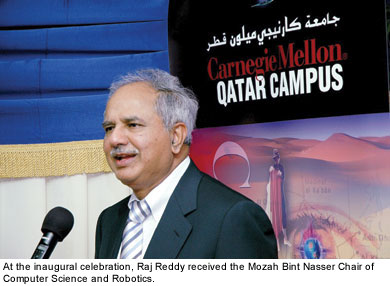When you think about Carnegie Mellon, you might picture the distinctive tower of Hamerschlag Hall or the long green lawn of the Cut.

But you could also picture the Great Wall of China or the Parthenon in Greece or many other famous landmarks around the globe. Through pioneering initiatives worldwide, the university continues to spread far beyond its campus in Pittsburgh.
Paul Goodman, the Richard M. Cyert Professor of Organizational Psychology and director of the Institute for Strategic Development, believes that internationalization is imperative for Carnegie Mellon.
“The complex set of global economic, political, technological and social forces creates great opportunities for a unique university such as Carnegie Mellon to enhance its leadership in technology, the arts, research and innovations in learning,” says Goodman.
The university is responding to these opportunities by creating international programs and partnerships, all characterized by the university’s commitment to collaboration and interdisciplinary problem-solving and innovation.
These initiatives benefit not only the Carnegie Mellon community but also the Pittsburgh region. According to David Ruppersberger, president and CEO of the Pittsburgh Technology Collaborative, “Carnegie Mellon’s international ‘outposts’ provide a platform for economic development organizations to begin meaningful discussions with companies outside the Pittsburgh region.”
The initiatives highlighted here are just a few of Carnegie Mellon’s many international endeavors, which are as varied as the many countries and cultures they bridge.
Inauguration of first international campus

Inaugural celebrations were held on March 9 and 10, 2005, to honor the opening of Carnegie Mellon University in Qatar, the university’s first international campus offering undergraduate degrees in business and computer science following a curriculum program parallel to that in Pittsburgh.
Hosted by the Qatar Foundation, the celebrations included a leadership symposium on “The Future of I.T.” and “Managing in a Global Market,” featuring a panel of experts from Carnegie Mellon’s computer science and business schools, Qatari government officials and international business leaders.
The symposium was followed by an evening gala attended by Her Highness Sheikha Mozah Bint Nasser Al Missned, chairperson of Qatar Foundation and a tireless promoter of progressive education in the region.
According to President Jared L. Cohon, “Carnegie Mellon shares with Qatar Foundation the firm belief that knowledge can bridge cultures and promote peace and prosperity.”

At the inaugural gala Carnegie Mellon’s Qatar Campus also announced the Mozah Bint Nasser Chair of Computer Science and Robotics, awarded to Raj Reddy, the Simon University Professor of Computer Science and Robotics in the School of Computer Science. Professor Reddy has been an early influence in establishing the Qatar campus and a world leader in robotics and computing research for more than 25 years.
The world of cybersecurity

Securing cyberspace requires cooperation that cuts across traditional international boundaries. Through initiatives like Carnegie Mellon CyLab and the Information Networking Institute (INI), the university has formed partnerships that are disseminating cybersecurity research and education around the globe.
CyLab, a university-wide, multidisciplinary initiative to advance research and education in trustworthy computing, joined forces with the Korea Information Security Agency (KISA) to create Carnegie Mellon CyLab Korea. Carnegie Mellon CyLab Korea has offices in both Pittsburgh and Seoul where experts work together to develop new technologies and paradigms that will usher in an era of more secure computers, networks and communications systems.

In Japan, CyLab and the Hyogo Prefectural Government are responding to an urgent need for graduate professional training in information security. Beginning this fall, INI, the education arm of CyLab, and the Heinz School of Public Policy and Management will offer a master of science in information technology-information security track (MSIT-IS) degree in Kobe in collaboration with the Hyogo Institute of Information Education Foundation.
The Athens model goes global

The MSIT-IS program in Japan is based on the successful master of science in information networking (MSIN) degree program already established in Greece, a collaboration of INI and Athens Information Technology (AIT). Carnegie Mellon awarded diplomas to its second graduating class in Athens on May 7.
The graduates represented the Information Networking Institute Athens MSIN program’s first international class, with students from India, Bulgaria, Romania, Lebanon, Greece, the Ukraine and the U.S. According to Dena Haritos Tsamitis, director of INI, this was a key event and signified a turning point in the institution’s efforts to make its internationally unrivalled professional degree programs accessible worldwide.
The university will also collaborate with AIT to expand its global cybersecurity research capacity in information and security with the establishment of Carnegie Mellon CyLab Athens.
Technology in the South Seas

This summer, 11 students and recent graduates from the Heinz School, Computer Science and Humanities and Social Sciences are spending 10 weeks in the Cook Islands, Palau, Micronesia and Sri Lanka. They will be helping government and nonprofit agencies develop computer systems that will allow them to better serve their citizens and maintain vital information.
The trip is based on an undergraduate course that is part of the university’s TechBridgeWorld initiative, which aims to help developing nations use technology to enhance suitable and sustainable development.
“Many universities offer the chance to go abroad but only a university like Carnegie Mellon offers the chance to go to another country and actually work while both learning and teaching those around you,” said Justin Cinicolo, a 2005 graduate with a double major in human-computer interaction and information systems. Cinicolo is working with three other students in the Cook Islands to help the government digitize its laws, develop systems to manage welfare and border control information, and develop electronic government policies.
Working in harmony with China

When Tongji University, a leading national tech university in Shanghai, People’s Republic of China, wanted to establish a music department, Carnegie Mellon was the number one model they wanted to emulate.
Tongji’s former president Wu Qidi, currently the Vice Minister of China’s Ministry of Education, initiated the project with the twin goals of providing opportunities for musicians and broadening the educational experience for engineers and scientists. Since then, Alan Fletcher, head of the School of Music, and Hanna Li, associate professor of music, have made several trips to China to offer advice.
According to Fletcher, “The creation of the first school of music in a great scientific and technical university in China is a perfect project for Carnegie Mellon—it expresses our ideals of crossing boundaries between the arts and technology. This is what the world expects from Carnegie Mellon.”
Breaking Barriers

The gender and racial gaps in computer science in South Africa are narrowing, thanks in part to Carnegie Mellon’s Institute for Software Research International (ISRI). In collaboration with South Africa’s Department of Communication, the university’s long-standing graduate program in information technology and software engineering for South African women has made a significant difference in how women are shaping the future of the country through technology applications.
Cross border collaboration
One of Carnegie Mellon’s longest-running international partnerships is with Mexico’s ITESM (Instituto Tecnologico y de Estudios Superiores de Monterrey), the country’s largest technological institution.

“When we initiated the long-term relationship with ITESM more than 10 years ago, we didn’t anticipate the many possible benefits,” says Paul Goodman, director of the Institute for Strategic Development. “We have done joint studies, a music master’s class, the 'Management Game,' etc. all by using technology in a creative and low-cost way. In addition, we have engaged in doctoral education, joint executive programs and student exchange programs. It has been a mutually beneficial partnership.”
Global ambassadors…Alumni
International alumni are instrumental in continuing to support the university’s presence abroad by making connections with other alumni, enhancing the university’s visibility and prestige, recruiting the best and brightest students, and facilitating corporate and government partnerships around the world.
“There is warmth and enthusiasm among international alumni that even eclipses that of alumni domestically,” says Judy Cole, associate vice president for advancement and director of alumni relations. “The further away they are from the center, the hungrier they are for connections.”
This enthusiasm has translated into great surges in the international alumni networks. In India, the number of active alumni has increased in the last two years from fewer than 100 to more than 400, with groups in Mumbai, Bangalore and New Delhi.
...and Students
The 2,400 plus international students at Carnegie Mellon bring global perspective from more than 90 countries to the Pittsburgh campus. Each year 250 students take part in study-abroad programs, including university study, studio art, internships and service learning.
Related Links:
Paul Goodman
Inauguration of first international campus:
Carnegie Mellon in Qatar
Inaugural Celebration for Carnegie Mellon’s Qatar Campus
Raj Reddy
The world of cybersecurity:
Carnegie Mellon CyLab
Information Networking Institute
CyLab Korea
CyLab Japan
Athens Model Goes Global:
Master of Science in Information Networking Program in Athens
Dena Haritos Tsamitis
Technology in the South Seas:
Working in harmony with China
Breaking Barriers



